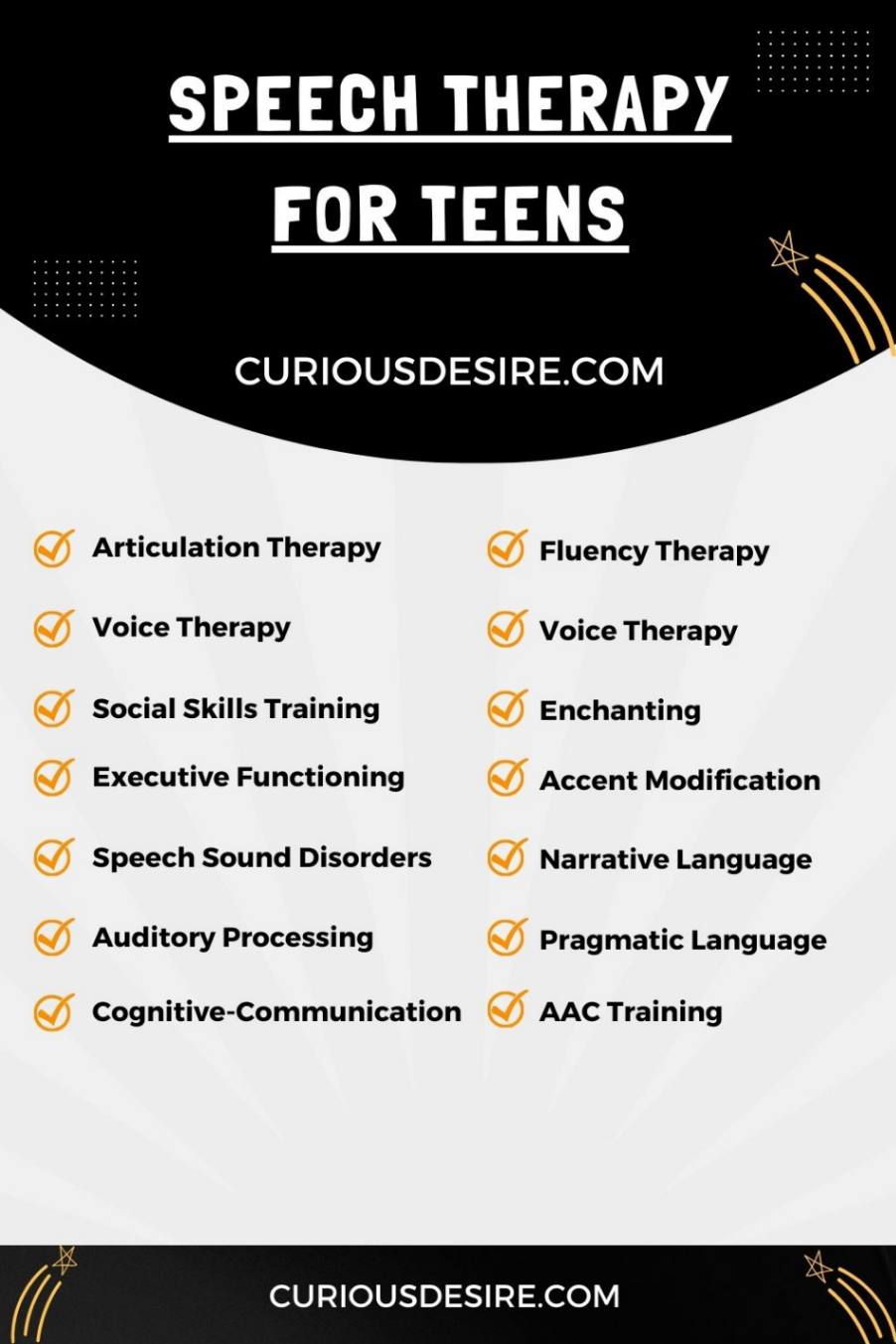Speech therapy is an important and transformative support system for teenagers, offering far-reaching benefits that extend beyond the mere improvement of speech and language skills.
In the dynamic landscape of adolescence, effective communication plays a pivotal role in shaping personal relationships, academic success, and future professional journey.
This therapeutic intervention becomes a cornerstone for teens, empowering them with the tools needed to handle social interactions, express themselves confidently, and build a foundation for a successful and fulfilling life.
In this article, the significance of speech therapy for teens lies not only in refining verbal communication but also in promoting self-esteem, resilience, and the ability to face the unique challenges of their formative years.
Here are the 5 most common reasons for speech therapy for teens:
- Articulation Therapy
- Fluency Therapy
- Voice Therapy
- Language Therapy
- Social Skills Training
1. Articulation Therapy
Clear and precise speech is important for effective communication. Teens may struggle with articulation, making it hard for others to understand them. This therapy helps teens improve their pronunciation of sounds and words.
Clear articulation is important for school, social situations, and future job opportunities. It enhances confidence and ensures that others can comprehend what they are saying.
Imagine a teen saying “thun” instead of “sun.” This could lead to misunderstandings and affect how others perceive them. Articulation therapy aims to correct such mispronunciations.
The following are the improvement tips:
- Practice specific sounds with tongue twisters.
- Use mirrors to observe mouth movements.
- Engage in conversations, focusing on clear pronunciation.
Articulation therapy lays a foundation for effective communication. It is a fundamental aspect of speech therapy, addressing the clarity of speech sounds to enhance overall communication skills for teens.
2. Fluency Therapy
Fluency therapy is like a coach for teens who want their words to flow smoothly. It’s important because some teens might find it tricky to talk without getting stuck or repeating words.
For instance, a teen might say, “I-I-I want to go out,” and fluency therapy helps them speak without these interruptions.
Teens learn simple tricks in fluency therapy, like breathing better and talking at a comfortable speed. It’s like giving their speech a tune-up, helping them chat confidently and share thoughts without those little speech hiccups.
Fluency therapy plays an important role in overall speech improvement. Addressing interruptions and hesitations, sets the stage for more effective communication skills, building the foundation for success in other areas of speech therapy.
3. Voice Therapy
Voice therapy is like a friend for teens who want to ensure their voice sounds strong and clear. It’s important because sometimes a teen might have a scratchy or weak voice, making it hard for others to hear them, like in a noisy classroom.
Voice therapy includes exercises to strengthen vocal cords, teaching teens how to breathe and make their voices sound better. It’s like a workout for their voice, so they can speak up confidently without straining.
4. Language Therapy
Language therapy is like a language workout for teens who want to improve how they talk and understand others.
It’s important because some teens might struggle with finding the right words or putting sentences together, impacting their schoolwork or conversations.
In language therapy, teens play games and do activities to boost their vocabulary and improve how they express themselves. It’s like giving their language skills a boost, helping them talk and understand better in different situations.
Language therapy is a fundamental aspect of speech improvement as it targets the building blocks of communication.
Enhancing vocabulary and sentence construction, positively influences overall speech therapy, enabling teens to communicate more effectively.
5. Social Skills Training
Social skills training is like a friendly guide for teens aiming to enhance how they interact with others. It’s important because, at times, teens may face challenges in making friends or handling social situations.
For instance, if a teen finds it tough to join group conversations or struggles with initiating interactions, social skills training steps in.
Through various activities and guidance, it teaches them how to start conversations, actively listen, interpret social cues, and overall, make connecting with peers smoother.
This training not only boosts their confidence but also helps them build more meaningful relationships.
6. Cognitive-Communication Therapy
Cognitive communication therapy acts as a workout for the brain’s communication muscles, ensuring teens are in top shape for effective interaction.
This therapy is vital for teens who may encounter difficulties in understanding, remembering, or expressing themselves. Consider a scenario where a teen struggles to organize their thoughts during a class discussion.
Cognitive-communication therapy becomes the solution by targeting and strengthening cognitive abilities.
Exercises and strategies, help teens improve their ability to process information, recall details, and express themselves clearly, ultimately empowering them to actively participate in various communication scenarios.
7. Accent Modification
Accent modification serves as a supportive coach for teens seeking to refine their accents for clearer communication. It becomes important when a teen’s accent poses challenges in being understood by others.
Take, for example, a teen with a strong accent facing misinterpretations during presentations or group discussions.
Accent modification sessions provide a constructive space where teens can work on adjusting specific sounds without losing their identity. It’s not about changing who they are but ensuring their message is communicated effectively.
By addressing accent-related barriers, these sessions empower teens to express themselves more confidently in diverse communication contexts.
8. Augmentative and Alternative Communication (AAC) Training
AAC training is like a toolkit for teens who may struggle with traditional forms of communication. It’s important because some teens face challenges in expressing themselves verbally.
For instance, a teen with speech difficulties might find it hard to convey thoughts.
AAC training introduces alternative methods, such as using communication devices or symbols, enabling teens to effectively express themselves.
Improvement involves familiarizing them with these tools and practicing their usage, giving them a reliable means of communication.
AAC training recognizes that verbal communication might not be the only route, ensuring that teens have access to effective alternative methods, thus enhancing their overall communication skills.
9. Pragmatic Language Intervention
Pragmatic language intervention is like a guide for teens to navigate the social aspects of communication. It’s important because some teens may struggle with using language appropriately in different situations.
For example, a teen might find it challenging to understand when humor is suitable. Pragmatic language intervention involves teaching them the nuances of communication, like using appropriate tone and understanding social cues.
Improvement entails practicing these skills in various scenarios, helping teens communicate more effectively in different contexts. Pragmatic language enriches speech therapy by focusing on the social aspects of communication.
It ensures that teens not only speak clearly but also understand the subtleties of language in different situations, contributing to more well-rounded communication skills.
10. Auditory Processing Therapy
Auditory processing therapy is like a workout for a teen’s ability to understand and process what they hear. It’s important because some teens may struggle with listening, following instructions, or distinguishing sounds.
For instance, a teen might find it challenging to concentrate in a noisy classroom. Auditory processing therapy involves activities to enhance these skills, such as listening exercises and auditory discrimination tasks.
Improvement comes from consistent practice, strengthening their ability to process and comprehend auditory information.
Auditory processing therapy complements speech therapy by addressing foundational skills like listening and processing auditory information.
11. Speech Sound Disorders Therapy
Speech sound disorders therapy plays an important role in supporting teens who grapple with difficulties in accurately producing specific speech sounds. This could manifest as challenges in pronouncing sounds like “r” or “s.”
Through a series of targeted exercises and repetitive practices, teens engage in activities that focus on refining their articulation skills, helping them overcome pronunciation hurdles, and promoting clearer and more confident verbal communication.
12. Narrative Language Intervention
Narrative language intervention becomes a vital component for teens facing obstacles in constructing cohesive and well-organized stories.
When a teen encounters difficulties in narrating events in a logical sequence, this therapy steps in to provide essential skills for organizing thoughts effectively.
By engaging in activities that emphasize the development of coherent narratives, teens participating in narrative language intervention not only enhance their storytelling abilities but also contribute to improved communication both in academic and social contexts.
13. Executive Functioning Therapy
Executive functioning therapy is like a helpful guide for teens as they tackle things like planning, organizing, and solving problems – all important parts of good communication.
For example, if a teen is finding it hard to put together ideas for a school presentation, this therapy can be a big help.
By practicing specific exercises and strategies, teens get better at these important executive functions. It’s like giving them tools to plan things out, clearly organize their thoughts, and solve problems logically.
This helps them express themselves more clearly and effectively, making communication smoother and more successful.
14. Metacognitive Communication Therapy
Metacognitive communication therapy becomes a pivotal component for teens in developing heightened awareness and control over their communication processes.
This therapy is particularly important for teens who may struggle with self-monitoring or adapting their communication based on different contexts.
For example, a teen might unknowingly use inappropriate language in certain settings.
Through tailored interventions and activities, therapy enhances teens’ abilities to reflect on and adjust their communication appropriately, empowering them to handle diverse social situations with increased awareness and adaptability.
Enhancing Speech Therapy for Teens: Practical Strategies for Success
Making speech therapy for kids better and more fun involves using approaches that fit each child. Here are easy ways to improve speech therapy, so kids can get better at talking and have a good time learning.
These strategies help kids make progress in their speech skills and enjoy the learning process.
1. Consistent Practice
Engage kids in regular and enjoyable practice sessions, turning speech exercises into a routine that becomes familiar and comfortable for them.
2. Engaging Activities
Introduce fun and interactive games that make speech therapy feel like playtime, promoting enthusiasm and sustained interest in the learning process.
3. Use of Technology
Make use of the power of speech therapy apps and interactive tools designed for kids, transforming traditional exercises into engaging digital activities that captivate their attention.
4. Parent Involvement
Empower parents with guidance on how to reinforce speech exercises at home, creating a collaborative effort between therapists and families for consistent support.
5. Positive Reinforcement
Implement a system of praise and positive reinforcement to celebrate small victories, promoting a motivating environment that encourages children to persevere in their speech journey.
6. Individualized Approach
Tailor speech therapy plans to the unique needs and interests of each child, recognizing that personalized strategies are key to addressing individual challenges effectively.
7. Multisensory Techniques
Utilize a mix of visual aids, games, and hands-on activities to engage different senses, making the learning experience dynamic and appealing to various learning styles.
8. Speech Therapy Games
Incorporate speech therapy into games and playful activities, turning learning into an enjoyable experience that naturally aligns with a child’s desire for fun and exploration.
9. Structured Routine
Establish a predictable routine for therapy sessions, providing a sense of stability and comfort for children, and promoting a positive association with the learning process.
10. Communication in Daily Life
Encourage the practical application of speech skills in everyday situations, bridging the gap between therapy sessions and real-world communication scenarios.
11. Feedback and Adjustments
Maintain an open line of communication with both children and parents, regularly gathering feedback to adjust and refine the therapy plan based on individual progress and needs.
12. Collaboration with School
Foster collaboration with school professionals to align speech therapy goals with the child’s overall educational plan, ensuring a cohesive approach to development.
13. Variety of Materials
Introduce a diverse range of speech materials, such as books, pictures, and props, keeping therapy sessions interesting and stimulating various aspects of speech development.
14. Setting Realistic Goals
Establish achievable short-term goals to celebrate small victories, maintaining children’s motivation by showcasing their progress in tangible and attainable ways.
15. Cultural Sensitivity
Consider cultural factors in therapy approaches, incorporating sensitivity to diverse backgrounds to create an inclusive and understanding learning environment.
Conclusion
In a nutshell, speech therapy is really important for teens. It’s not just about talking better; it’s like having a guide that shows teens how to express themselves with confidence.
This isn’t just handy for schoolwork; it also makes chatting with friends and handling future job stuff much easier. Think of it as a journey that boosts self-confidence and helps teens tackle the ups and downs of growing up.
So, speech therapy matters a lot for teens – it’s like a key to a more confident and successful future!
Speech Therapy For Teens FAQs
1. Why is Speech Therapy Important?
Speech therapy is important because it helps people, especially kids and teens, talk better. It’s like a coach that teaches them how to express themselves clearly and confidently.
2. Can Speech Therapy Help with Stuttering?
Yes, speech therapy can help with stuttering. Therapists use special techniques to make speech smoother, like taking breaths and speaking at a comfortable pace.
3. What Games are Used in Speech Therapy?
Speech therapists use fun games to make learning exciting. Games like word puzzles and storytelling help improve speech and language skills while making it enjoyable for kids.
4. How Does Speech Therapy Work for Pronunciation?
Speech therapy works for pronunciation by focusing on specific sounds. Through practice and exercises, therapists help individuals say sounds like “r” or “s” correctly, making their speech clearer.
5. Can Speech Therapy Help Kids with Reading?
Absolutely! Speech therapy can make reading easier for kids. By working on sounds and language skills, it helps them understand and enjoy reading more.
6. Do Speech Therapy Apps Work?
Yes, speech therapy apps can be super helpful. They make learning like playing games on a phone or tablet, making it fun for kids while improving their speech and language skills.
7. Can Adults Benefit from Speech Therapy?
Yes, adults can benefit from speech therapy too. It helps with things like clear communication at work, improving pronunciation, and gaining more confidence in speaking.
8. How Long Does Speech Therapy Take to Show Results?
The time varies, but with regular practice, people often see improvements in a few weeks or months. Consistency in attending sessions and practicing at home plays a big role in getting good results.
Resources Used For The Research:


